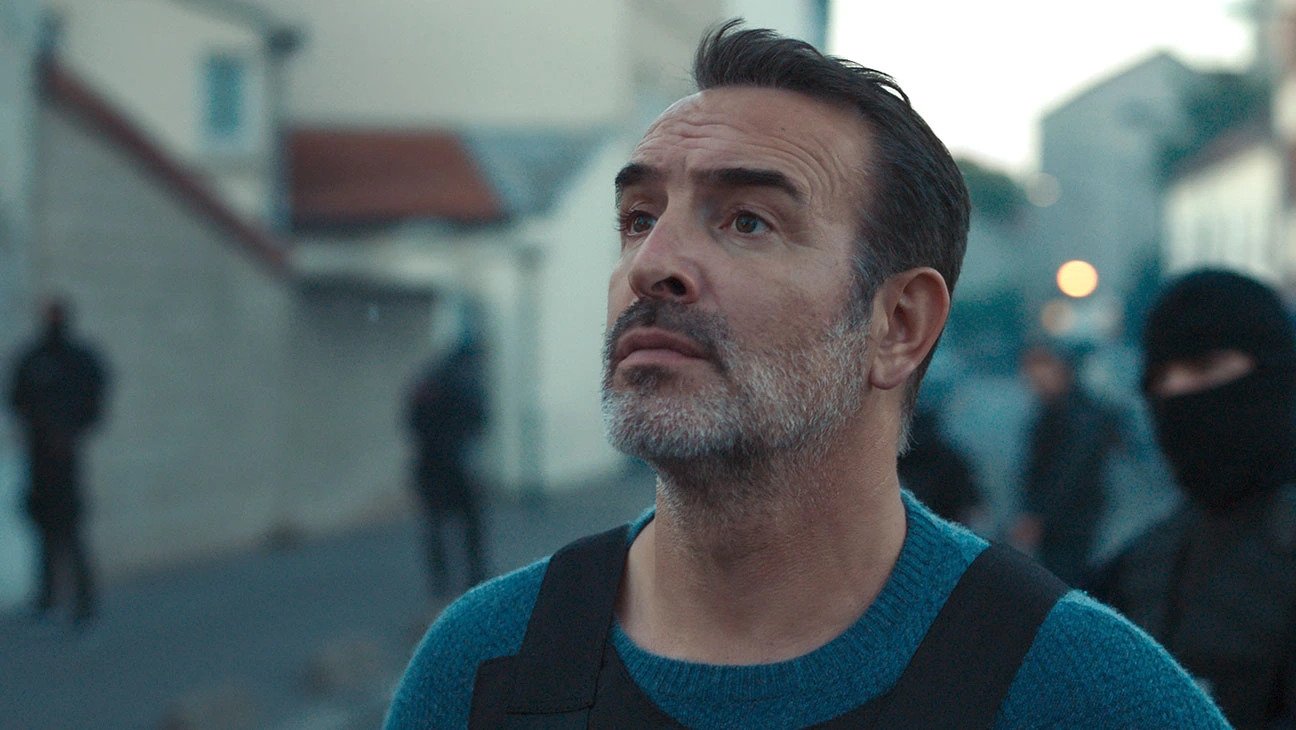The world was shocked by the terrorist attacks in Paris in November 2015. Director Cédric Jimenez’s fictionalised procedural November concentrates on the vast manhunt undertaken by the French security forces in the days directly after the attacks. Dividing the film into chapters which serve to show each day that follows the events, November charts the vast human toll on not only the citizens of Paris but also those who are responsible for finding the culprits and preventing further attacks. The film shows the machinations of the security forces, from the people who oversee operations to the officers at the forefront of the on the ground surveillance and investigation.
November is very much a French film. An American version of the story would hold up the lead Fred (Jean Dujardin) as a heroic presence and work as a character study of his struggle to find the fugitives. Jimenez is not particularly interested in his lead, he gives more character development to secondary characters, especially Captain Inès Moreau (Anaïs Demoustier) and the informer Samia (Lyna Khoudri). The film has little time to dwell on individuals, as is evident in its large ensemble cast, but Jimenez allows small moments from different characters to reveal the extreme pressure the task force is under and balance that with the breakneck pace of the film which only slows down when the taskforce reaches an impasse.
The film begins in Athens with Fred working in conjunction with anti-terrorist forces trying to infiltrate a cell. The main target, Ahed Abaaoud, evades capture. From the kinetic opening which sees the task force move through crowded markets heavily armed, Jimenez sets the forward momentum of the film. Fred and his coordinator Heloise (Sandrine Kiberlain) are flying back to France when they hear of the Paris attacks. Jimenez chooses not to show the attacks instead allowing the urgency of the response to convey the weight of what has happened. Tension is evident in the scale of the response and the media criticism that the anti-terrorist task forces and police are facing. Coming soon after the Charlie Hebdo attacks people are wondering why the attacks weren’t prevented and what more may come.
Fred’s taskforce consists mainly of Marco (Jérémie Renier) running the daily operations. They have little to go on with conflicting reports confusing their efforts. During the investigation it becomes clear that there is a Belgian connection and that two of the terrorists may still be in the city planning further attacks.
Dead ends and red herrings plague the taskforce until they get a call from a young woman, Samia, who believes her friend Hasna (Saraj Afcahin) has a cousin who might have been involved. Suspicion falls on Samia herself but Inès is convinced she is telling the truth – why would the young woman who faces extreme repercussion come forward with the information? Samia’s intelligence leads the taskforce to an underpass on a highway where homeless people live and where the two suspects are hiding out.
Jimenez uses the race against time formula to keep the momentum in the film. There are periods in which the momentum dips, and this is deliberate. The sheer scope of the operation shows how stop and start it is. Hospital bedside interviews with victims show the human cost of the attacks and the smallest bits information, such as the colour of a pair of sneakers, can change the course of the investigation. Balancing out the urgency with the grind of procedure means the film can become muddied in places.
When Jimenez and screenwriter Olivier Demangel choose to slow the pace, it is to concentrate on Samia and Inès and the risks inherent in Samia coming forward and how frustrated Inès is that she has manipulated the young woman into risking her life. What is at stake is bigger than one person, but the ethical questions involved with creating an operative in Samia weigh on Inès. So much is happening so quickly, including France undertaking military strikes, Fred travelling to Morocco, operatives moving through Paris watching potential suspects, that the focus on Samia and what she personally risks is essential to humanise the story.
November is a classic manhunt thriller in many ways; there are explosive action scenes, a ticking clock, exhausted operatives and chaos at all levels of the investigation. It reflects the reality of the undertaking, but it seems too cluttered in places. It becomes overwhelming to try to keep up with what is unfolding – which is of course what would be happening on the ground – but for an audience the tangents the film goes off on can be confusing leading to some exhaustion. However, when the final act coheres November blasts home why the action by the security services has been essential and how insidious terrorist networks are.
Although Jean Dujardin is the star and the face on the poster, the most effective performances come from Anaïs Demoustier and Lyna Khoudri. Giving space to Khoudri’s character Samia is what anchors the film in humanity rather than being a spectacle devoted to the manhunt. November is for the most part a slick production and an urgent one but trying to condense such a massive undertaking means that there are limitations, especially as the audience isn’t completely sure which way the manhunt is moving at times. Regardless, November is gripping and even if it is overstuffed in places it is a forceful thriller which tries to make sense out of something that is inherently senseless.
Director: Cédric Jimenez
Cast: Jean Dujardin, Anaïs Demoustier, Sandrine Kiberlain
Writers: Olivier Demangel, Cédric Jimenez, (with LB, Thibault Roux, Cyrille Lopez, Jeanne Herry)



